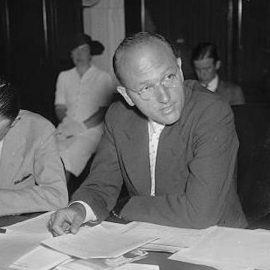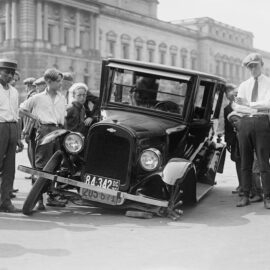

This article is an excerpt from the Shortform book guide to "American Prometheus" by Kai Bird and Martin Sherwin. Shortform has the world's best summaries and analyses of books you should be reading.
Like this article? Sign up for a free trial here.
What happened to J. Robert Oppenheimer after he lost his security clearance? Was his public reputation ever restored?
In American Prometheus, Kai Bird and Martin Sherwin examine J. Robert Oppenheimer’s life before, during, and after the bomb, detailing the politically motivated security hearing that saw him lose his security clearance in 1954. Then, they shift to his exile from the upper ranks of the US government.
Read more to learn about Robert Oppenheimer’s later life.
Robert Oppenheimer’s Later Life
Bird and Sherwin contend that the loss of Oppenheimer’s security clearance signified his fall from grace in the eyes of politicians and much of the American public. They argue that Oppenheimer effectively underwent a transformation after the security hearing: In Robert Oppenheimer’s later life, he was no longer an inside adviser on nuclear policy but instead an exiled intellectual. We’ll discuss Bird and Sherwin’s account of this transition followed by Oppenheimer’s later political rehabilitation by the Kennedy administration.
The Shift from Political Insider to Public Intellectual
According to Bird and Sherwin, Oppenheimer’s public activism became increasingly selective in the years following his security hearing. They argue that he became reticent to speak about nuclear policy and instead spoke more generally on the interaction between science and culture.
For example, Bird and Sherwin point to Oppenheimer’s reaction to President Eisenhower’s nuclear policies. According to Oppenheimer’s friend David Lilienthal (a coauthor of the Acheson-Lilienthal Report), Oppenheimer refused to sign petitions advising the US to avoid preemptive nuclear conflict with Communist China in 1955. Though Oppenheimer allegedly agreed with the petition’s sentiment, he thought it unwise to imply the US government needed outside advice on nuclear policy. Bird and Sherwin argue that this instance reveals that, post-hearing, Oppenheimer wanted to appear patriotic and give no fuel to his critics.
(Shortform note: Eisenhower’s “New Look” policy laid out his stance toward nuclear weapons during the Cold War with the Soviet Union. He proposed stockpiling nuclear weapons to deter the Soviets (and other communist nations) from declaring war against the US, a proposal that resulted in an exponentially larger US nuclear arsenal.)
However, the authors point out that, regarding other topics, Oppenheimer spoke freely. One year after the hearing, for instance, Oppenheimer published eight essays urging scientists to be transparent with the public. These publications, Bird and Sherwin maintain, show that Oppenheimer remained keenly concerned about broader cultural issues, though he balanced this concern with his wish to appear a faithful American.
(Shortform note: Though Oppenheimer’s desire to appear patriotic may have been caused by the security hearing, it also reflected a broader trend in the US known as the “Red Scare.” During the Red Scare in the 1950s, the American public and politicians became increasingly concerned about communism pervading American society. Consequently, American citizens sought to make their patriotic commitments clear to avoid arousing suspicion of having communist sympathies.)
Oppenheimer’s Political Rehabilitation
Bird and Sherwin further argue that, although Oppenheimer never regained his security clearance, the Kennedy Administration rehabilitated his political image by awarding him the prestigious Enrico Fermi Prize for public service. According to Bird and Sherwin, this 1963 award was highly symbolic: It represented Democrats’ belief that Oppenheimer was the victim of Republicans’ politically charged attacks the previous decade. And, though Oppenheimer remained a divisive political figure, the award signified a shift in his favor just four years before his death.
(Shortform note: While the Kennedy Administration began to rehabilitate Oppenheimer’s image, the Biden administration went a step further in 2022—it retroactively reversed the AEC’s decision to revoke Oppenheimer’s security clearance, indicating that the AEC’s original decision was little more than a politically motivated scheme. In his interview with The New York Times, American Prometheus coauthor Kai Bird praised this decision by the Biden administration, calling the AEC’s original decision a “black mark on the honor of the nation.”)

———End of Preview———
Like what you just read? Read the rest of the world's best book summary and analysis of Kai Bird and Martin Sherwin's "American Prometheus" at Shortform.
Here's what you'll find in our full American Prometheus summary:
- The biography of J. Robert Oppenheimer that inspired the movie Oppenheimer
- Oppenheimer's early life and mental health struggles
- Oppenheimer's role in developing the atomic bomb and the following hearing






